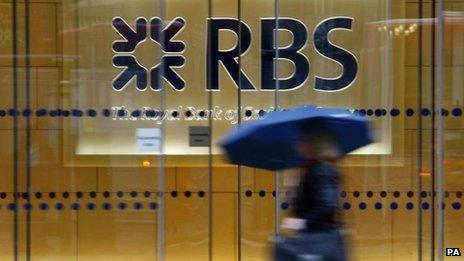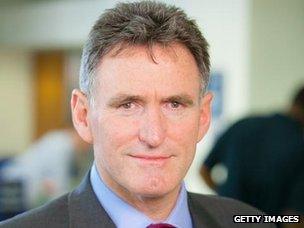Royal Bank of Scotland 'must do better'
- Published
- comments

There is a simple overarching message from the flurry of announcements about Royal Bank of Scotland this morning: the giant largely nationalised bank has to work harder if taxpayers are to stand a chance of getting back the £46bn they've invested in it.
As expected, the chancellor has shied away from physically extracting £38bn of toxic loans sitting on RBS's balance sheet into a new so-called bad bank owned 100% by the state.
Instead these poor quality assets will be managed separately within RBS, and re-named RBS Capital Resolution Group.
The new plan is for RBS to somehow get rid of up to 70% of this radioactive debt - which contains the worst of the bank's commercial property and Irish lending - over two years, with a hope that perhaps it can all be gone within three years.
This means selling some of it at a bigger loss than would otherwise have been the case, to the mild detriment of RBS's capital, the vital financial resources it holds to cushion depositors from shocks.
But the idea is that when it's all gone, RBS will feel liberated - since the sheer poisonous quality of these loans means they "consume" a whole fifth of RBS's capital, such that the relevant 20% of capital is not available to support new credit and healthy credit creation.
Lacking momentum
RBS's board, supported by the chancellor and the regulator, the Prudential Regulation Authority (PRA), has also determined that the bank doesn't have quite enough capital, for three reasons.
First, like most banks, it fears that the penalties, fines and compensation payments it faces from its sins during the boom years will escalate.
That looks a shrewd judgement on a day when the US state-backed mortgage giant Fannie Mae is suing nine banks, including RBS and Barclays, over the manipulation of the Libor interest-rate benchmark, and RBS has suspended two currency traders connected to regulators' investigations into whether banks rigged the foreign exchange market.
Second, RBS expects to be told by the PRA in December that it needs to hold more equity capital, following completion of a review by the regulator of the specific risks each of the biggest banks poses to UK financial stability.
Third, and perhaps most embarrassingly, RBS's business in the round lacks what the bank describes as adequate "momentum" to generate the relevant capital simply by generating bigger profits.
Putting these three factors together, RBS's board has determined that by the end of 2016 it needs a 12% ratio of loss-absorbing capital to assets weighted by the riskiness of individual loans on the "fully loaded" Basel lll measure (or the new international rules for how much capital banks must hold).
That is a full third more capital than RBS currently holds. And it may seem a tall order for RBS to raise all that capital without asking taxpayers to supply more.
However, it would probably be a resigning issue for the chancellor if his stewardship of the bank required it to receive more state aid. And RBS says it can raise the relevant capital by doing two things.

Ross McEwan wants RBS to concentrate on becoming a very British commercial bank
It plans to accelerate the disposal of its big US bank, Citizens, by floating it on the US stock market next year, with the ambition of getting rid of all its shares in Citizens within three years.
And the bank will work harder in general to remove from its balance sheet the loans and investments that consume most of its capital while contributing the least profit.
New focus
Does this bring the risk that RBS still won't provide the loans desperately needed by British households and businesses after many years of the bank shrinking its support for the UK economy?
Some will fear it does.
However, RBS's new chief executive, Ross McEwan, says he has the opposite plan in mind.
He says that since his bank is no longer a weapon of lethal mass wealth and economic destruction - for which he thanks his predecessor, Stephen Hester - it can now become focused as a very British commercial bank, serving the needs of British people and companies.
Mr McEwan's plans can be seen as the culmination of the rolling back of so much of the expansion of RBS that took place during the boom years, under the leadership of its tarnished former chief executive, Fred Goodwin.
First on the agenda is fixing the way RBS provides finance to small and medium sized enterprises (or SMEs), following the publication this morning of a damning report into the bank's performance in this economically vital activity, which it commissioned from the former deputy governor of the Bank of England, Sir Andrew Large.
Sir Andrew confirms what much of the world was saying about RBS since the crisis of 2008, that it was turning away too many businesses wanting finance and providing far less credit to small companies than it should have been doing, given its market leading position.
And Sir Andrew has uncovered a number of causes: the fragmentation of how SME lending was managed; unrealistic targets being set for lending; too much risk aversion by relationship managers and risk officers; and - perhaps most damningly - the inadequate skills of the lending bankers.
Mr McEwan recognises the importance of fixing SME lending, not only for the health of the bank but for the growth prospects of the British economy - as RBS's natural share of lending to small business should be about a quarter.
It will have no place to hide when trying to mend its performance, given that the Federation of Small Businesses and the British Chambers of Commerce are launching a new and supposedly authoritative annual league table of all banks' performances supporting smaller companies.
This survey will identify Britain's best small-business bank - and that would not have been RBS in recent years.
'Can do better'
But what Mr McEwan says he wants to fix goes wider.
He complains that it takes longer than should be the case for anyone to open an account at RBS. In general he thinks the bank does not serve its customers well enough.
In a letter to his tens of thousands of employees, he says: "We still receive far too many complaints, often on issues that would never arise if our systems and processes were more effective".
And he points out that the return the bank is earning on its investment capital - its "core return on equity" - has actually been falling, in spite of a revival of the British economy. And that is not a good sign.
As Mr McEwan says: "We must do better and we can do better."
As for the Chancellor, George Osborne, he takes heart from a couple of things.
First, the last of the special additional support that was provided to RBS to prop it up after the 2008 debacle has been unwound: a Treasury facility to provide £8bn of new capital to RBS in an emergency, which is costing the bank £300m a year, has gone a year earlier than planned.
But perhaps most important for Mr Osborne, he believes that he, the regulator and the board of RBS now all share a common belief about the direction RBS should be taking.
There may be another way of seeing this: all those public denials by RBS and the Treasury that they were not at loggerheads during the Hester years don't seem quite so compelling, on a morning when Mr Osborne says it's brilliant that he, RBS and the Bank of England are at last all singing the same song.